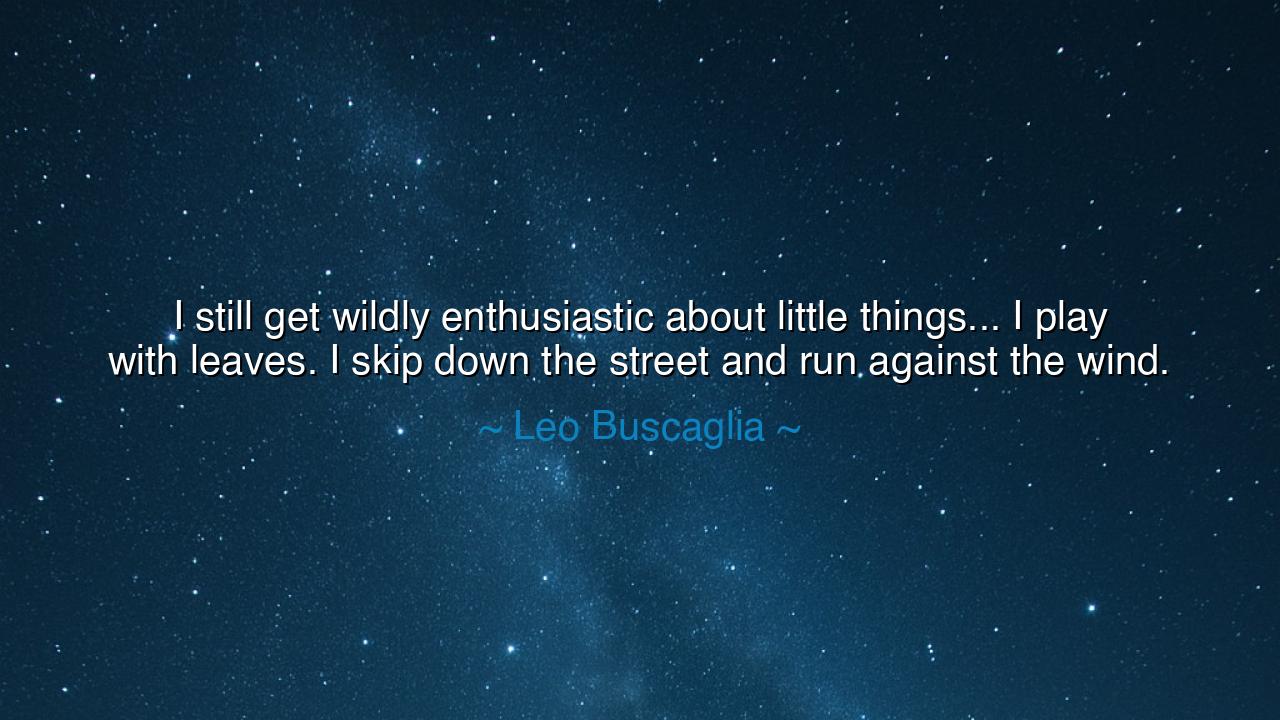
I still get wildly enthusiastic about little things... I play
I still get wildly enthusiastic about little things... I play with leaves. I skip down the street and run against the wind.






The words of Leo Buscaglia — “I still get wildly enthusiastic about little things... I play with leaves. I skip down the street and run against the wind.” — are not the idle musings of a childlike heart, but a sacred reminder of how the soul must remain awake to joy. They are a hymn sung to the spirit of wonder, an anthem to the simple acts that renew the marrow of our being. Buscaglia, often called “Dr. Love,” was a teacher of life, a herald of compassion, and his words carry the tone of ancient wisdom disguised in modern dress. In his vision, enthusiasm for little things is not triviality, but the doorway into eternity, for the divine often hides itself in the smallest corners of creation.
The ancients taught that a man is measured not only by his deeds of grandeur, but by the fervor with which he greets the rising sun, or the laughter of a child, or the rustling of leaves in autumn’s breath. To play with leaves is to honor nature as companion, to join in the dance of earth rather than stand apart. To skip down the street is to defy the heavy chains of adulthood that command us to march solemnly. And to run against the wind is to proclaim that life is a contest, not of victory over others, but of joyful resistance against the forces that would dull our spirit.
Consider the story of Diogenes, the philosopher who wandered the streets of Athens with his lantern, searching for an honest man. Though mocked by many, he delighted in simplicity, drank from his hands when his cup seemed unnecessary, and laughed at the pomp of kings. His joy in the “little things” was a defiance of society’s weight, much as Buscaglia’s words beckon us to reclaim a forgotten freedom. The world scorned Diogenes, yet he lived unburdened, finding treasures where others saw nothing.
Or think of Helen Keller, who, blind and deaf, yet exclaimed at the delight of touch, the fragrance of flowers pressed to her face, the vibration of a friend’s laughter carried through her hand. What others would dismiss as “little things” became for her the very gateway to existence. Her enthusiasm was not diminished by deprivation, but heightened by gratitude. She, too, “ran against the wind,” refusing to let fate silence her joy.
This is the heart of Buscaglia’s teaching: the childlike soul is not a stage to be discarded, but a posture of eternity. To keep wonder alive is to resist the creeping numbness of routine. In every leaf that trembles on a tree, in every gust that tosses our hair, in every step that can still be skipped instead of dragged, there lies a whisper from the universe: “You are alive. Do not forget.”
Yet we must not stop at reverie. The lesson demands action. Each day, let us choose one small act of joy. Pause to admire a cloud. Skip, if only for three steps. Play with your child’s laughter as if it were music. If you walk to work, let the wind be your sparring partner rather than a nuisance. These are not childish games; they are rituals of the spirit, disciplines of the heart that train us to stay awake.
And when sorrow comes — as it surely will — these little treasures will become our shield. For he who has cultivated delight in the small things possesses an inner fortress that cannot be breached by despair. The man who runs against the wind for joy will also stand against the storm with courage.
So let the teaching be clear: do not wait for greatness to feel alive. Seek instead the sacred in the ordinary. Enthusiasm is not wasted on the trivial; it is the fire that sanctifies existence. Live as if each leaf were a miracle, each street a playground, each wind a challenge sent to awaken your strength. In this way, you will not merely pass through life — you will dance within it.






AAdministratorAdministrator
Welcome, honored guests. Please leave a comment, we will respond soon